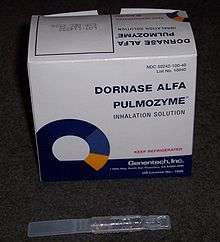Dornase alfa
Dornase alfa (proprietary name Pulmozyme from Genentech) is a highly purified solution of recombinant human deoxyribonuclease I (rhDNase), an enzyme which selectively cleaves DNA. Dornase alfa hydrolyzes the DNA present in sputum/mucus of cystic fibrosis patients and reduces viscosity in the lungs, promoting improved clearance of secretions. This protein therapeutic agent is produced in Chinese hamster ovary cells.
| Clinical data | |
|---|---|
| Trade names | Pulmozyme |
| AHFS/Drugs.com | Monograph |
| MedlinePlus | a694002 |
| Pregnancy category |
|
| Routes of administration | Inhalation |
| ATC code | |
| Legal status | |
| Legal status |
|
| Identifiers | |
| CAS Number | |
| DrugBank | |
| ChemSpider |
|
| UNII | |
| CompTox Dashboard (EPA) | |
| ECHA InfoCard | 100.029.685 |
| Chemical and physical data | |
| Formula | C1321H1999N339O396S9 |
| Molar mass | 29253.9 g·mol−1 |
| | |

Cystic fibrosis
Dornase alfa is the most recent therapeutic agent developed with this basic mechanism of action. Prior to the cloning of the human enzyme, bovine DNase I was on the market for many years, though its utility was limited by the inherent antigenic response to a cow protein in the lungs of patients. Other DNases, such as DNase II, have therapeutic potential as well, but no further DNases have been brought to market yet for cystic fbrosis.
Dornase alfa is an orphan drug.[1]
Contraindications
- Hypersensitivity to dornase alfa
- Hypersensitivity to Chinese hamster ovary cell products
Economy
Dornase alpha 1000 units (1 mg/ml)2.5ml (2500units) = £18.52 (GBP)
Off label use
Dornase alfa has recently been shown to improve lung function in non-cystic fibrosis pre-term infants atelectasis where other therapies have failed.[2][3]
In studies conducted, Dornase alfa has been thought to help resolve mucus secretion in CoViD-19 patients as well as in the treatment of cystic fibrosis, but since it is taken with nebulizer in general use and there is a possibility of aerosolization of the virus, it is not preferred in most medical centers to avoid secondary infections.[4]
References
- Collier, Joe (1 September 1995). "Dornase-alfa and orphan drugs". The Lancet. 346 (8975): 633. doi:10.1016/S0140-6736(95)91460-9.
- Erdeve O, Uras N, Atasay B, Arsan S (2007). "Efficacy and safety of nebulized recombinant human DNase as rescue treatment for persistent atelectasis in newborns: case-series". Croat Med J. 48 (2): 234–9. PMC 2080511. PMID 17436388.
- Hendriks T, de Hoog M, Lequin MH, Devos AS, Merkus PJ (2005). "DNase and atelectasis in non-cystic fibrosis pediatric patients". Crit Care. 9 (4): R351-6. doi:10.1186/cc3544. PMC 1269442. PMID 16137347.
- Barnes, Betsy J.; Adrover, Jose M.; Baxter-Stoltzfus, Amelia; Borczuk, Alain; Cools-Lartigue, Jonathan; Crawford, James M.; Daßler-Plenker, Juliane; Guerci, Philippe; Huynh, Caroline; Knight, Jason S.; Loda, Massimo (2020-06-01). "Targeting potential drivers of COVID-19: Neutrophil extracellular traps". Journal of Experimental Medicine. 217 (6). doi:10.1084/jem.20200652. ISSN 0022-1007.